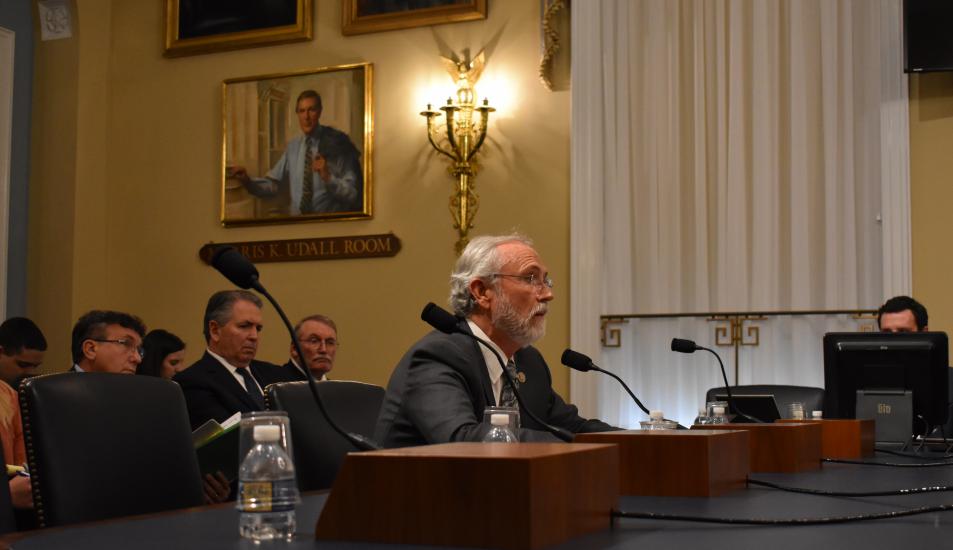Yakima Basin Plan: Newhouse Testifies at Hearing to Support Legislation Authorizing Next Phase

Kittitas Reclamation District Manager testifies on behalf of the Yakima Basin Working Group
WASHINGTON D.C. – Today, Rep. Dan Newhouse (R-WA) testified at a House Natural Resources Committee Subcommittee on Water, Power and Oceans hearing on legislation sponsored by Rep. Newhouse and Rep. Dave Reichert (R-WA), H.R. 4419, Bureau of Reclamation and Bureau of Indian Affairs Water Project Streamlining Act. H.R. 4419 would streamline the Bureau of Reclamation's and Bureau of Indian Affairs' environmental planning and study process for new water projects and authorize the next phase of the Yakima Basin Integrated Plan. The bill would apply the same streamlined water project development process used by the U.S. Army Corps of Engineers under the Water Resources Reform Development Act of 2014 to the Bureau of Reclamation and to the Bureau of Indian Affairs in order to facilitate the construction of new or expanded surface water, storage, infrastructure, and recycling projects. H.R. 4419 broadens the legislation to include additional surface water storage projects, water infrastructure projects, rural water projects, water recycling, and Title XVI water projects. The legislation authorizes Phase III of the Yakima River Basin Integrated Water Resource Management Plan, an initiative to better accommodate the water needs of the agricultural community, conservationists, residents, and other stakeholders in the Yakima River Basin region.
Transcript of Rep. Newhouse's testimony:
Thank you, Chairman Lamborn, Ranking Member Huffman, as well as Members of the Subcommittee for inviting me to testify before you today on H.R. 4419, the "Bureau of Reclamation and Bureau of Indian Affairs Water Project Streamlining Act."
This legislation exhibits years of hard work, determination, and certainly collaboration. I'd like to begin by extending my sincere thanks to Chairman Bishop and his staff, as well as Speaker Ryan and his staff, for working with me to help move this legislation forward. I'd also like to thank my colleague, Congressman Reichert, for his continued partnership on these efforts. This legislation is not only critical for our respective Districts in Washington state, but also Districts across the nation, particularly those in the West.
As you know, water is vital for the livelihoods and the prosperity of communities in the western United States. These communities, including my constituents in Central Washington, know all too well the detrimental impacts of facing severe droughts and water shortages. In states where the Bureau of Reclamation and Bureau of Indian Affairs hold jurisdiction for the development of water projects, communities are left waiting due to the lack of a streamlined process. H.R. 4419 would apply the same streamlined water project development process used by the U.S. Army Corps of Engineers, that was established under the "Water Resources Reform Development Act of 2014," or WRRDA, to BOR and BIA's processes for surface water, storage, infrastructure, and recycling project developments. The WRRDA legislation passed through both chambers of Congress with overwhelming bipartisan support. My hope with this legislation is to achieve the same streamlined process for BOR and BIA that was developed for the Corps.
This legislation also authorizes several key water development projects across the West, including projects in California, Kansas, Montana, and in my home state of Washington. One of these is the third phase of a vital effort in Central Washington, the Yakima River Basin Water Enhancement Project, or YRBWEP. The Yakima River Basin is one of the leading agricultural regions in Washington State as well as throughout the country. However, the demand for water in the region currently exceeds the resources available, especially during times of drought, which have hit the state especially hard in the past few years. Through years of tough and complex, but continued negotiations, the Yakima River Basin Plan is a model of collaboration that offers a solution to give water users more certainty, while also recognizing the concerns of conservationists and the various stakeholders in the Yakima Basin.
I would be remiss if I didn't acknowledge the collaborative group of stakeholders at the core of this vital effort. The YRBWEP Workgroup and its Implementation Committee are made up of local irrigation districts, environmental advocates, local elected officials, tribal leaders, state agency officials, conservation organizations, and water storage advocates. The fact that this diverse of a group can agree on much, let alone negotiate and collaborate on years of integrated water project development efforts, is nothing short of ground-breaking. I look forward to hearing testimony from one of the Implementation Committee's own, Mr. Urban Eberhart, and I thank the Subcommittee for providing the opportunity for the Workgroup to share their model of success with the nation. It's something that I can tell you I am very, very proud of.
Mr. Chairman, H.R. 4419, the "Bureau of Reclamation and Bureau of Indian Affairs Water Project Streamlining Act" is a commonsense bill that reforms the current cumbersome and lengthy processes for water development efforts and provides a mechanism to build new water and infrastructure projects in Central Washington as well as across the West. This legislation will provide the next major step to addressing our water crisis in the West. I thank the Subcommittee for allowing me to testify today, and I certainly look forward to working with you to get this bill signed into law.
Mr. Urban Eberhart of Ellensburg, Secretary/Manager of Kittitas Reclamation District and a farmer, testified at the hearing on behalf of The Yakima Basin Working Group in support of the legislation:
"We are tremendously grateful to Representative Dan Newhouse and Representative Dave Reichert for their tireless work in supporting the Yakima Basin Integrated Plan and for introducing this legislation. They understand how important the Integrated Plan is to the Yakima River Basin, the State of Washington, and the Yakama Nation, and have been looking for ways to move the authorization for the Integrated Plan forward through the House and Senate, then on to the President's desk."
Click here to watch Mr. Eberhart's full testimony.
Click here for additional witness testimony and to watch the full hearing.